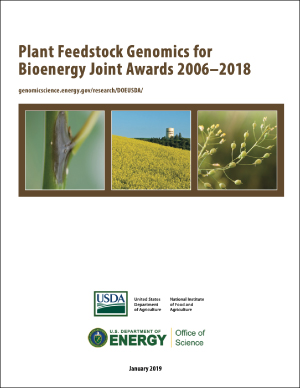USDA-DOE Plant Feedstock Genomics for Bioenergy
Summary of projects awarded in 2018 under Funding Opportunity Announcement DE-FOA-0001857
- Print Publication: January 2019
- Download: Print-quality PDF
Summary
Integration of U.S. Department of Energy Office of Science (DOE) and U.S. Department of Agriculture (USDA) capabilities supports genomics-based research that will lead to the improved use of plant biomass and feedstocks for the production of biofuels and renewable chemical feedstocks. Working together, USDA’s National Institute of Food and Agriculture (NIFA) and DOE’s Office of Biological and Environmental Research (BER) encourage research on herbaceous and woody plants with improved resistance and tolerance to disease and disease complexes and on nonfood oilseed crops for improved winter cold tolerance and survivability and agronomic traits. This USDA-DOE research strives to overcome the biological barriers to the low-cost, high-quality, scalable, and sustainable production of dedicated bioenergy biomass feedstocks using the tools of genetics and genomics.
Renewable energy and other bio-based products from plants, especially lignocellulosic biomass from herbaceous and woody species and lipids from seed oils, have the potential to reduce or remove dependency on fossil fuels as well as to reduce negative environmental impacts from emissions of greenhouse gases and toxic pollutants. Realizing the potential of these plants will require the development of high-yielding biomass crops and trees and nonfood oilseed crops that efficiently use resources and minimally disrupt existing food and fiber markets. The growth of such dedicated crops and trees in large areas will likely present previously unseen challenges such as the possibility of increased pressure from known and newly identified diseases and disease complexes, as well as their subjection to uncertain abiotic stresses as production ranges of the plants expand. Projects funded in 2018 continue a commitment initiated in 2006 to conduct fundamental research in biomass genomics, providing the scientific foundation to facilitate the use of plant materials for the production of bioenergy and bio-based products. The USDA-DOE program continues to build upon gains in genetic and genomic resources for supporting research to investigate potential challenges and exploit new opportunities for accelerating the breeding of dedicated bioenergy and bio-based product feedstocks, specifically to (1) identify and characterize the molecular mechanisms underlying plant resistance and tolerance to pathogens and (2) conduct genomic and genetic research on nonfood oilseed feedstock crops:
- Genomics-based research to identify and functionally characterize plant genes and alleles that influence plant responses to pathogens, with a focus on disease across a range of environments where biomass feedstocks could be produced. Targeted crops include perennial grasses, biomass sorghum, energy cane, woody biomass species, and oilseed crops. The long-term goal is to develop a clearer understanding of the key genes and processes responsible for superior feedstock plant performance under increasing pathogen pressure and with minimal impacts on the surrounding ecological landscape, using the results to inform breeding programs. Specific research areas encouraged include:
• Discovery and characterization of key plant genes and alleles that confer disease resistance and tolerance.
• Research to develop new cultivars of regionally adapted bioenergy feedstocks with enhanced biomass yield and improved resistance and tolerance to pathogens. - Genomics-based research to identify and functionally characterize plant genes and alleles that influence agronomic, yield, and quality traits of nonfood, industrial oilseed crops including, but not limited to, Brassica species, Camelina, pennycress, and Lesquerella. Specific research areas encouraged include:
Discovery and characterization of key plant genes and alleles that confer adaptation to a range suboptimal conditions including (a) winter cold temperature and mild-to-moderate water deficits; (b) important agronomic traits such as reduced seed shattering, high seed germination, and reduced seed dormancy; and (c) increased nutrient-use efficiency.
Research to develop new cultivars of regionally adapted oilseed feedstocks with enhanced yields and desirable oil qualities for biofuels and other bio-based products.

